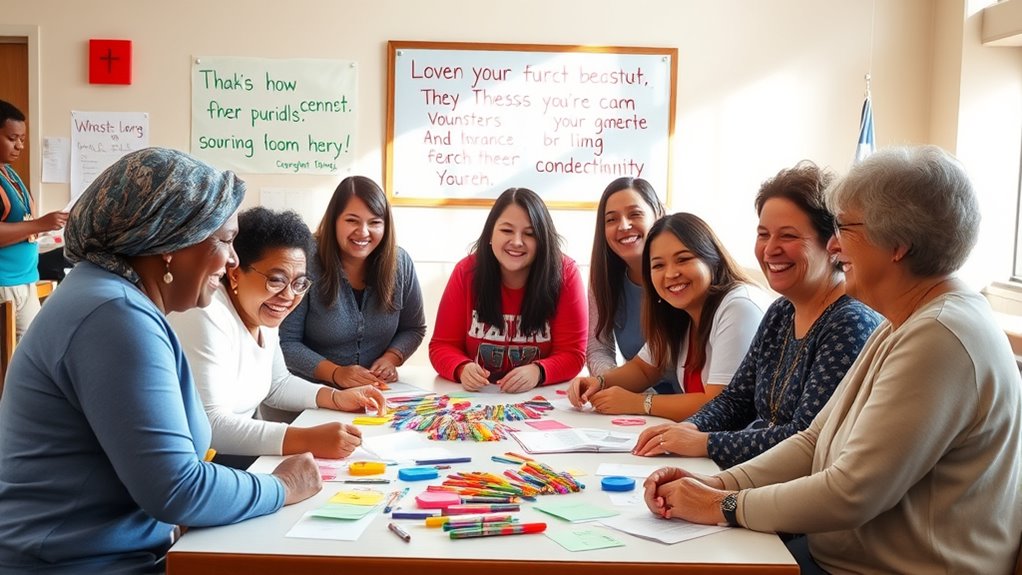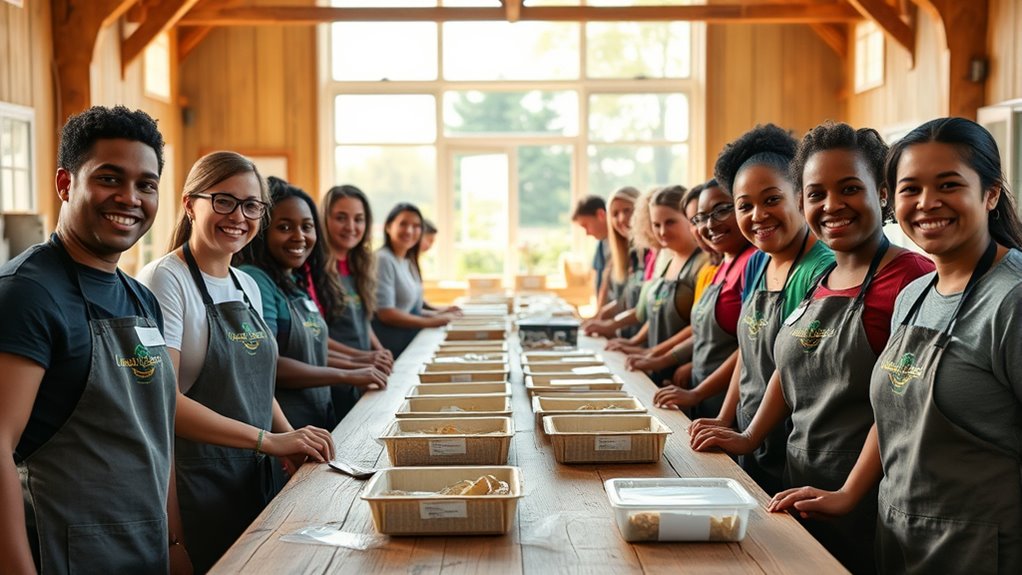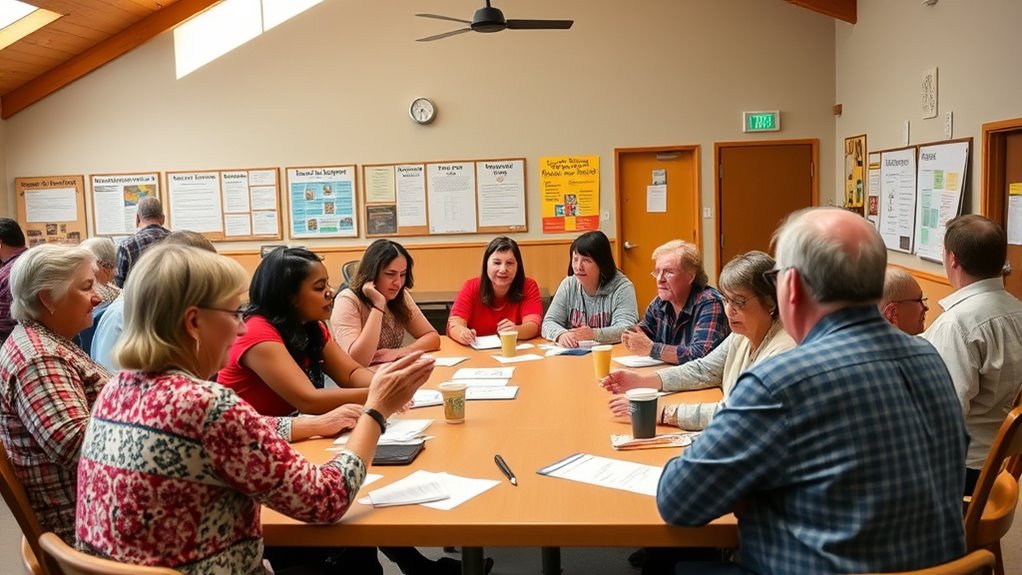To encourage service and involve members in volunteer ministry, focus on creating an inclusive environment that celebrates diverse contributions and fosters personal connections. Match volunteers with roles that suit their skills and interests, provide ongoing training and resources, and communicate the impact of their efforts. Recognize achievements publicly and foster shared leadership. Building trust and open communication boosts commitment. Keep exploring ways to strengthen involvement, and you’ll discover even more strategies to inspire lasting engagement.
Key Takeaways
- Foster open communication and regular meetings to invite member input and build trust in volunteer opportunities.
- Match members’ skills and interests with suitable roles to increase motivation and commitment.
- Develop personal connections through welcoming gestures, recognition, and mentorship to strengthen engagement.
- Clearly communicate the ministry’s vision and impact using stories and visuals to inspire participation.
- Gather ongoing feedback and assess efforts regularly to adapt strategies and enhance volunteer involvement.
Understanding the Importance of Member Engagement

Understanding the importance of member engagement is essential because engaged members are more likely to participate actively and support your organization’s goals. When members feel connected, they experience spiritual growth that fuels their commitment and enthusiasm. Engaged members also contribute to community outreach efforts, helping expand your organization’s reach and impact. By fostering involvement, you create an environment where members see their contributions making a difference. This sense of purpose encourages ongoing participation and strengthens the collective mission. When members are invested, they’re more likely to attend events, volunteer their time, and invite others to join. Additionally, divorce statistics highlight how strong community support can be vital during challenging transitions, emphasizing the importance of a supportive and engaged community. Ultimately, active engagement builds a vibrant, supportive community that thrives on shared values and common goals.
Identifying Volunteer Opportunities That Match Skills and Interests

To effectively match volunteers with suitable opportunities, you need to identify their unique skills and interests. Start by having open conversations or using simple surveys to gather this information. Matching interests ensures volunteers feel connected and motivated, increasing their commitment. Focus on skill-based roles that align with what volunteers excel at, whether it’s organizing events, offering technical support, or mentoring others. When you understand their strengths, you can place them in positions where they’ll thrive and contribute meaningfully. Remember, the goal is to create a mutually beneficial experience—volunteers feel valued, and your ministry gains dedicated helpers. By carefully matching interests with skill-based roles, you foster a sense of purpose and fulfillment that encourages ongoing service. Additionally, understanding specific skills like technical expertise or leadership abilities can help tailor opportunities that maximize each volunteer’s impact.
Creating a Welcoming and Inclusive Environment

To create a welcoming and inclusive environment, you need to foster open communication where everyone feels comfortable sharing their ideas. Celebrating diverse contributions shows that all voices matter and helps build a stronger community. When you prioritize these points, you encourage more meaningful and sustained engagement from your volunteers. Incorporating diverse perspectives can further enhance understanding and cooperation within the group.
Cultivate Open Communication
Creating a welcoming and inclusive environment starts with cultivating open communication. You encourage honest dialogue by establishing clear communication channels, such as regular meetings or digital platforms, where members feel safe to share ideas and concerns. Emphasize volunteer etiquette by promoting respectful listening and constructive feedback, which fosters trust and transparency. When you model open communication, you make it easier for members to ask questions, clarify expectations, and offer input. This openness helps identify challenges early and strengthens team cohesion. Remember, active listening shows you value every voice, making volunteers feel appreciated and understood. Additionally, utilizing predictive modeling can help anticipate common concerns or needs among volunteers, allowing for proactive support and engagement. By nurturing these habits, you create a space where everyone feels comfortable contributing, ultimately enhancing the sense of community and shared purpose.
Celebrate Diverse Contributions
Celebrating diverse contributions is essential for building a truly inclusive environment where everyone feels valued. By recognizing and honoring different perspectives, you foster intergenerational engagement and embrace cultural diversity. Encourage members to share their unique backgrounds and talents, creating opportunities for meaningful interaction across age groups and cultures. Highlighting these varied contributions shows that every individual’s efforts matter, strengthening community bonds. When you celebrate diverse contributions, you promote a welcoming atmosphere where everyone feels comfortable participating. This not only enriches the volunteer experience but also models respect and appreciation for differences. Embracing cultural diversity and intergenerational engagement makes your ministry more vibrant, inclusive, and effective in serving others.
Communicating the Vision and Impact of Service Activities

Effectively communicating the vision and impact of service activities helps inspire others and build support. When you clearly share how your initiatives foster service innovation and benefit the community, members see the significance of their efforts. Use stories and data to highlight tangible outcomes, such as new programs or increased outreach. Visuals, like photos or videos, can vividly illustrate progress and motivate participation. Keep your messaging consistent across channels to reinforce your goals. Emphasize how each person’s contribution advances the overall mission. By transparently sharing successes and challenges, you foster trust and engagement. When members understand the broader impact, they’re more likely to stay committed and encourage others to get involved. Clear communication transforms individual efforts into a collective movement for positive change. Recognizing the importance of ice cream consumption trends can also serve as a metaphor for embracing new ideas and flavors to keep service initiatives fresh and engaging.
Recognizing and Celebrating Volunteer Contributions

Recognizing and celebrating volunteer contributions is essential for maintaining motivation and fostering a sense of value within your team. When you acknowledge efforts, you reinforce their importance and inspire continued engagement. Consider these effective strategies:
- Host recognition events that honor volunteers’ dedication and showcase their impact.
- Share motivational quotes during meetings to uplift spirits and reinforce their significance.
- Publicly highlight individual contributions through newsletters or social media to boost morale.
These actions not only affirm volunteers’ hard work but also create a culture of appreciation. Celebrating milestones and expressing gratitude keeps enthusiasm alive. When volunteers feel valued, they’re more likely to stay committed and inspired to serve. Recognition isn’t just a gesture; it’s a powerful tool to strengthen your ministry’s community.
Providing Training and Resources for Effective Service

To guarantee your volunteers succeed, you need to offer tailored training programs that meet their specific needs. Making resources easily accessible helps them find what they require without hassle, while ongoing skill development keeps their service sharp. By focusing on these areas, you empower your team to serve more effectively and confidently. Incorporating effective training methods ensures volunteers remain motivated and well-equipped for their ministry roles.
Tailored Training Programs
Tailored training programs are essential for equipping your team with the skills and knowledge they need to deliver exceptional service. By customizing training, you guarantee volunteers excel in areas like community outreach and faith integration. Consider these key elements:
- Focused workshops that highlight effective community outreach techniques to connect with diverse groups.
- Faith-based modules that deepen understanding of how to integrate spiritual principles into service.
- Practical role-playing exercises to build confidence and reinforce learning.
- Incorporating aquatic exercise techniques can help volunteers develop teamwork and communication skills in engaging ways.
These components help volunteers understand their roles more clearly and serve with purpose. Tailoring your training programs ensures that each member is prepared to make a meaningful impact, strengthening both individual growth and your ministry’s overall effectiveness.
Resource Accessibility
Ensuring that volunteers have easy access to training and resources is essential for their effectiveness in service. You can facilitate this by leveraging digital tools that enable seamless resource sharing. Providing online platforms or repositories allows members to find materials quickly and learn at their own pace. Consider implementing a system where volunteers can access training videos, manuals, or schedules anytime. This not only boosts confidence but also encourages continuous engagement. To illustrate, here’s a simple example:
| Resource Type | Access Method |
|---|---|
| Training Manuals | Shared cloud folder |
| Workshop Videos | Internal website or app |
| Scheduling Info | Digital calendar |
| Feedback Forms | Online surveys |
Additionally, understanding the importance of contrast ratio can help in selecting the right visual resources to enhance learning environments, ensuring clarity and focus during training sessions.
Ongoing Skill Development
As volunteers continue their service, providing ongoing training and resources is essential for maintaining effectiveness and confidence. You can strengthen their skills and deepen their spiritual growth by focusing on three key areas:
- Workshops on community outreach, helping volunteers connect more effectively with those they serve.
- Refresher courses on service skills, ensuring volunteers stay current and confident in their roles.
- Resource libraries or online platforms, offering accessible materials for continuous learning.
- Incorporating elements of Bedroom design, such as creating a welcoming and comfortable environment, can also inspire volunteers to feel more at ease and motivated in their service roles.
Building Personal Relationships to Foster Commitment

Have you ever considered how building genuine personal relationships can strengthen commitment? When you focus on relationship building, you create personal connections that inspire members to stay engaged. These connections foster trust and a sense of belonging, making volunteers more invested in their roles. To illustrate, imagine this table:
| Member Type | Connection Approach |
|---|---|
| Newcomers | Welcome with genuine interest |
| Regulars | Recognize contributions regularly |
| Leaders | Personal check-ins and mentorship |
| Volunteers | Appreciate efforts with sincerity |
Encouraging Shared Leadership and Ownership

To foster shared leadership and ownership, you need to delegate responsibilities effectively, empowering others to take charge. Cultivating an ownership mindset encourages volunteers to see their roles as essential, increasing their commitment. Recognizing their contributions reinforces this sense of ownership and motivates ongoing engagement.
Delegate Responsibilities Effectively
Effective delegation is essential for fostering shared leadership and ownership within your team. When you delegate well, you empower members to take responsibility, which boosts morale and engagement. To do this effectively:
- Clearly define tasks and expectations to improve time management and prevent confusion.
- Match responsibilities to each person’s strengths, ensuring they can handle the workload confidently.
- Provide support and guidance, especially in conflict resolution, so members feel equipped to handle challenges independently.
Cultivate Ownership Mindset
Cultivating an ownership mindset starts with inspiring your team to see themselves as active partners in achieving shared goals. Use motivational strategies that highlight how their contributions directly impact the group’s success. Encourage ownership empowerment by giving members meaningful responsibilities and trusting them to make decisions. When people feel ownership over their tasks, they’re more invested and committed. Share leadership opportunities to foster a sense of shared responsibility, making everyone feel valued and accountable. Communicate clearly about goals and progress, reinforcing that their efforts matter. Recognizing their role in the bigger picture motivates continued engagement. By cultivating this mindset, you nurture a team that takes initiative, feels invested, and works collaboratively toward common objectives.
Recognize Volunteer Contributions
Recognizing volunteer contributions reinforces a sense of shared leadership and ownership within your team. When you acknowledge their efforts, you boost volunteer motivation and foster a stronger commitment. Use effective recognition techniques such as:
- Publicly praise volunteers during meetings or events to validate their impact.
- Send personalized thank-you notes that highlight specific contributions.
- Offer meaningful tokens of appreciation, like certificates or small gifts, to show genuine gratitude.
These methods encourage volunteers to see themselves as essential team members, increasing their sense of ownership. By consistently recognizing efforts, you create an environment where everyone feels valued and motivated to continue serving. Remember, simple acts of acknowledgment can transform volunteer engagement and strengthen your ministry’s shared leadership.
Utilizing Testimonials and Success Stories to Inspire Participation

Sharing testimonials and success stories can powerfully motivate others to get involved, especially when they see real people making a difference. When you highlight how volunteers have impacted lives, you create relatable examples that inspire action. Use testimonials to showcase authentic experiences, emphasizing the personal growth and fulfillment volunteers gain. Success stories demonstrate tangible results, illustrating the positive outcomes of service. These narratives build trust and encourage others to participate by showing that their efforts can create meaningful change. Keep stories genuine and focused on specific achievements to resonate deeply. By consistently sharing these inspiring accounts, you foster a culture of involvement and show potential volunteers the real impact they can have through their dedication.
Implementing Feedback and Continuous Improvement Strategies

Implementing feedback and continuous improvement strategies is essential for maintaining and enhancing the effectiveness of your service initiatives. By establishing strong feedback loops, you ensure members’ voices guide ongoing development. Here are three key steps:
Establish feedback loops and continuous assessment to keep your service initiatives adaptable and impactful.
- Collect regular input through surveys and conversations to identify strengths and areas for growth.
- Use continuous assessment to analyze feedback, measure progress, and set actionable goals.
- Implement adjustments based on insights, then revisit feedback to confirm improvements.
This cycle keeps your ministry adaptable and responsive. Emphasizing consistent feedback loops allows members to feel heard and invested. Continuous assessment helps you track progress and refine your approach. Together, they create a dynamic environment where service efforts continually evolve for greater impact.
Frequently Asked Questions
How Can I Motivate Shy or Hesitant Members to Volunteer?
To motivate shy or hesitant members, you should provide peer encouragement by sharing positive stories from volunteers and gently inviting them to participate. Personalize recognition by acknowledging their unique strengths and efforts, making them feel valued. Create a welcoming environment, offer small initial roles, and be patient. When members see genuine appreciation and peer support, they’re more likely to step out of their comfort zones and join in volunteer activities.
What Are Effective Ways to Overcome Volunteer Burnout?
Think of volunteer burnout like a garden overwatered; it needs balance. To prevent this, promote effective time management and encourage volunteers to set boundaries. Recognition programs act as sunlight, inspiring continued effort. For example, a small acknowledgment can boost morale and renew enthusiasm. Regularly check in with volunteers, offer support, and remind them their contributions matter—these steps help sustain their passion and reduce burnout.
How Do We Handle Conflicts Among Volunteers?
When conflicts arise among volunteers, you should prioritize conflict resolution by addressing issues directly and calmly. Encourage open communication and listen actively to understand each person’s perspective. Reinforce volunteer boundaries clearly to prevent misunderstandings and maintain a respectful environment. If needed, mediate discussions to find common ground. Remember, fostering a positive atmosphere helps volunteers feel valued and reduces conflicts, ensuring a smoother, more collaborative ministry.
What Strategies Ensure Long-Term Volunteer Retention?
They say ‘a little appreciation goes a long way,’ and that’s key to long-term volunteer retention. You should prioritize volunteer recognition regularly, celebrating their efforts sincerely. Plus, invest in leadership development to empower volunteers, helping them grow and feel valued. When you foster a supportive environment, volunteers stay committed longer, knowing their contributions matter. This approach builds loyalty and keeps your ministry thriving over time.
How Can Technology Enhance Member Involvement in Service?
You can enhance member involvement in service through effective digital outreach and virtual engagement. Use social media, email campaigns, and online platforms to share opportunities and stories, making it easy for members to stay connected. Hosting virtual meetings or service events allows participation from anywhere, increasing accessibility. By leveraging technology, you foster a sense of community and involvement, encouraging members to actively contribute and sustain their commitment over the long term.
Conclusion
By actively involving members in volunteer ministry, you create a vibrant, impactful community. Did you know that 85% of volunteers report feeling more connected and fulfilled when their contributions are recognized? Keep fostering engagement through clear communication, personalized opportunities, and genuine relationships. When members see their impact, they’re more likely to stay committed and inspired. Your efforts can transform service into a rewarding experience for everyone involved, strengthening both individuals and your entire community.










